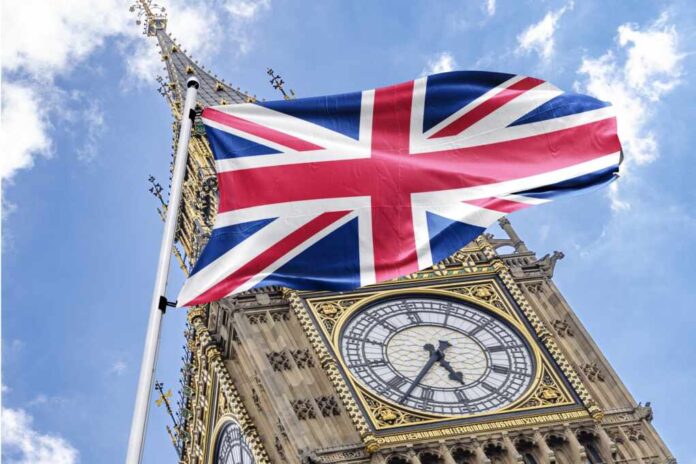
The United Kingdom has banned French philosopher Renaud Camus, creator of the controversial “Great Replacement” theory, from entering the country just as he was scheduled to speak at multiple events including the prestigious Oxford Union.
At a Glance
- French writer Renaud Camus has been barred from entering the UK, with officials claiming his presence is “not conducive to the public good”
- Camus was scheduled to speak at a Homeland Party meeting and the Oxford Union
- He is known for coining the term “Great Replacement,” a theory suggesting demographic shifts threaten European peoples
- The ban comes amid record immigration levels in the UK and growing political tensions around border control
- Camus’s publisher condemned the decision as a departure from liberal democratic principles
Government Ban Cites Public Interest Concerns
The British government has denied entry to French philosopher Renaud Camus, informing him that his “presence in the UK is not considered conducive to the public good.” The ban prevents Camus from attending scheduled appearances at both a Homeland Party event and the Oxford Union debating society, where he was invited to speak.
The Homeland Party, a minor political organization in Britain, focuses primarily on advocating for the deportation of migrants and addressing what they consider demographic concerns in the United Kingdom.
Camus’s planned visit coincides with what many observers note are record levels of immigration to Britain, with significant increases in both legal migration and illegal Channel crossings.
The decision to bar his entry comes as Prime Minister Keir Starmer’s government faces mounting criticism over its handling of immigration policy and border security challenges that have persisted through multiple administrations.
UK government, happy to allow in radical imams, bans a quirky Frenchman, thereby generating massive interest in his flawed “Great Replacement” theory. I despair at the stupidity of the British state …. https://t.co/bQcjQEoNku
— Douglas Carswell🇬🇧🇺🇸🇩🇰 (@DouglasCarswell) April 18, 2025
The Controversial Great Replacement Theory
Camus has gained international recognition as the originator of “the Great Replacement” theory, a concept that has become increasingly influential in European political discourse, particularly in France. The theory proposes that immigration, higher birth rates among immigrant populations, and lower birth rates among native Europeans are leading to a demographic transformation that threatens the cultural and ethnic character of European nations. Camus has argued that this demographic shift poses a graver threat to European peoples than historical conflicts.
In his writings, Camus has consistently criticized what he terms “globalist elites” for treating humans as interchangeable economic units rather than members of distinct cultural communities. His ideas have resonated with nationalist and traditionalist movements across Europe, while simultaneously drawing sharp criticism from those who view the theory as xenophobic or alarmist. Despite this polarization, his work has influenced political discourse well beyond France’s borders.
It is absolutely outrageous that the Home Office have deemed that our conference speaker's presence in the UK would not be 'conducive to the public good'.
Mr Camus has done vitally important work highlighting the cultural and demographic threat posed by mass immigration into… https://t.co/ZEIyNiAe8P
— The Homeland Party (@Homeland_Party) April 18, 2025
Publisher Condemns UK Decision
The ban has provoked immediate backlash from Camus’s supporters, most notably his publisher, Vauban Books. In a strongly worded statement, the publishing house defended Camus’s intellectual significance while condemning the British government’s decision as inconsistent with the principles of liberal democracy that the UK historically champions. The statement characterized the ban as an unwarranted restriction on intellectual freedom that ultimately validates Camus’s concerns about the erosion of Western values.
The Oxford Union’s invitation to Camus had already generated controversy before the government’s decision, with critics arguing that the platform would legitimize views they consider harmful. Defenders of the invitation pointed to the Union’s long tradition of hosting controversial speakers from across the political spectrum as part of its commitment to robust debate. The ban effectively ended this particular controversy while potentially creating a larger one about government limits on speech.
Our statement for The Telegraph on the Home Office's decision to bar @RenaudCamus from entering the UK 👇
“The decision to bar Renaud Camus from the UK is only further confirmation that that country has abandoned the most basic principles of liberal democracy. Camus is one of… https://t.co/3ZD7KWaiW7
— Vauban Books (@VaubanBooks) April 18, 2025
Free Speech Implications
The decision to bar Camus has raised significant questions about free speech in the United Kingdom and the appropriate boundaries of governmental authority in determining which viewpoints may be expressed within its borders. Critics of the ban argue that silencing controversial thinkers undermines democratic principles and prevents important social discussions, even when those discussions involve uncomfortable or divisive ideas. They suggest that robust debate, not government restriction, is the proper response to challenging viewpoints.
Supporters of the ban counter that certain ideas can have harmful social consequences when amplified, and that governments have a legitimate interest in limiting speech that might contribute to social division or hostility toward specific groups. The United Kingdom has historically maintained broader speech restrictions than countries like the United States, with laws against hate speech and incitement that give authorities wider latitude to limit certain forms of expression.

























